Jerusalem Travel Guide
Though Jerusalem is a place of pilgrimage for the Muslim, Christian and Jewish faiths, people from all over the world are drawn to the destination regardless of their religious beliefs. The relatively small area of the Old City is arguably one of the most atmospheric ancient enclaves remaining in the world, and is characterised by winding old streets, ancient fortifications and an almost tangible sense of history. Most who holiday in Jerusalem come to immerse themselves in the religious and historic attractions of this ancient city, including iconic religious sites such as the Church of the Holy Sepulchre, Temple Mount and the Western Wall.
Jerusalem is also not without modern attractions and the city has many world-class museums and art galleries, and hosts a number of cultural festivals. The city is well located to be a springboard to some of Israel's most remarkable landscapes and attractions.
Best time to visit Jerusalem
Summers in Jerusalem are hot, but the months of July and August remain high season for a Jerusalem holiday, despite accommodation being more expensive and queues longer. Both spring and autumn (around May and September) are great seasons to travel to visit, as the days are sunny and warm. For budget travellers, the least expensive is the cool (but wet) winter, between November and March. Many facilities are closed during the Jewish Passover and some other religious holidays.
What to see in Jerusalem
-Pay tribute at Yad Vashem, Israel's moving Holocaust memorial.
-Visit the Israel Museum to learn about the Holy Land from the prehistoric to the present.
-Stroll around the famous Citadel of David, admiring the views, the exhibits and the ancient architecture.
-See where Jesus was born just outside of Jerusalem, in Bethlehem.
What to do in Jerusalem
- Explore the ancient Hezekiah's Tunnel, which winds beneath the city.
- Float in the unique, healing waters of the Dead Sea.
- Take an excursion to Masada, one of Israel's most famous tourist attractions.
- Walk the footsteps of Jesus on the Via Dolorosa, or the Way of the Cross, through Old Jerusalem.
Beyond Jerusalem
Israel is not a big country and Jerusalem is a great base for excursions to other famous sites and tourist attractions, such as Masada, the Roman Crater and The Dead Sea. Tel Aviv, the coastal city known as the heart of Israel's contemporary nightlife and shopping scene, is within easy reach and complements the more sombre and ancient treasures of Jerusalem with its young, hip atmosphere.
Getting there
International flights to Jerusalem and Tel Aviv land at Ben-Gurion International Airport, which is situated nine miles (14km) southeast of Tel Aviv, and 30 miles (50km) west of Jerusalem. It takes about 40 minutes to drive from the airport to Jerusalem and there are buses and taxis available.
Did you know?
-The city of Jerusalem is over 3,000 years old.
-Considering the number of people, of various religions, who hold Jerusalem sacred, it can be called the most holy city in the world.
-Jerusalem has more than 2,000 archaeological sites.
Things to do in Jerusalem
A holy city in three major world religions, it is not surprising that the iconic attractions in Jerusalem are almost exclusively religious sites. However, pilgrims and sightseers will find attractions such as the Church of the Holy Sepulchre, Temple Mount and the Western Wall enthralling because of their age and global significance. Exploring Jerusalem's religious sites, such as Bethlehem and the Via Dolorosa, is rewarding even with a secular mind-set, as the cultural and historical aspects of these famous places can be extremely interesting. Of course, for the faithful, these sites are profoundly important.
If visitors are interested in the political situation as well as the history of Israel and the Jewish people, there are a number of world-class museums to visit in Jerusalem, including the Israel Museum and Yad Vashem (the Holocaust memorial museum). The Tower of David, known as The Citadel, also houses a remarkable museum.
For lovers of history there are gems such as Hezekiah's Tunnel, dug as a water conduit under Jerusalem about 2,700 years ago, and Masada, an ancient fortification set on a picturesque mountaintop. The latter is Israel's most popular paid attraction.
Things to see and do in Jerusalem also include natural attractions, many of which, such as the Mount of Olives and the Garden of Gethsemane, have religious significance. Worthwhile excursions out of Jerusalem include trips to the eternally popular Dead Sea, and the unique, crater-like Makhtesh Ramon rock formation.
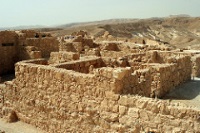
Masada
The mountaintop fortress of Masada (sometimes spelled Massada) is one of Israel's most popular and remarkable tourist attractions. Situated in the Judean Desert and overlooking the Dead Sea, this site is where 967 Jewish Zealots rose against Rome in 66 AD, taking their own lives when defeat seemed inevitable. King Herod built the ancient fortress they defended against Roman siege.
Visitors can still explore the ruins of ancient structures and palaces, and see the remains of the most complete Roman siege system in the world. The Roman camps, siege wall and ramp are still clearly visible. Masada is a UNESCO World Heritage Site and a place of profound interest for military-history buffs.
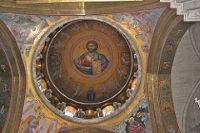
Church of the Holy Sepulchre
As the site of Jesus' crucifixion, burial and resurrection, the Church of the Holy Sepulchre is the holiest Christian place in Jerusalem. Emperor Constantine constructed it in 326, and its structure has suffered frequent damage over the centuries. The Church contains the Chapel of Golgotha and the three Stations of the Cross where Jesus was crucified, and the Sepulchre itself marks the place of his burial and resurrection. This incredible church is filled with treasures and should be of great historical and architectural interest regardless of one's religious beliefs. It is an absolute must for Christians. The church is home to several Christian denominations.
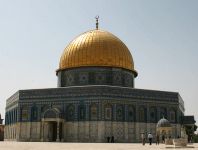
Temple Mount (Al-Haram al-Sharif)
Temple Mount is tremendously important to Jews, Muslims and Christians alike. Located within the Old City's walled section, its glinting, golden Dome of the Rock is easily Jerusalem's most distinguishable feature. From a Jewish and Christian perspective, the large rock is said to be where Abraham offered his son Isaac up for sacrifice. Many believe that the First Temple once housed the Ark of the Covenant. Visitors should also note that the Israeli government prohibits non-Muslim prayer on the site. Muslims believe that Muhammad ascended to heaven from the same rock so, for this reason, they built the Dome over this site in the 7th century.
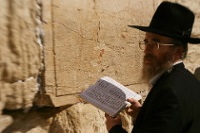
Western Wall (HaKotel HaMaaravi)
The Western Wall (Wailing Wall to non-Jews) is the most sacred Jewish prayer-site in the world. Thousands of worshippers gather year-round to pray here, and to place folded written prayers into the wall's crevices. The wall is all that remains of the Second Temple of Jerusalem, built by King Herod in 20 BCE. It is made up of enormous stone blocks, and endures as a tribute to the scale of workmanship in past eras. Following Orthodox Jewish practice, the praying sections have been separated for men and women. Men are required to wear a skullcap (kippah) and women must be modestly dressed.
Via Dolorosa
The Via Dolorosa (Road of Sorrow) is the route Jesus is said to have followed as he carried the cross to his crucifixion. There are 14 stations along the way commemorating different events, starting at Lion's Gate in the Muslim Quarter of the Old City, where Jesus was convicted by Pontius Pilate, and ending at his tomb inside the Church of the Holy Sepulchre in the Christian Quarter. A steady stream of pilgrims remember and honour Jesus' sacrifice by walking the Way of the Cross every year.
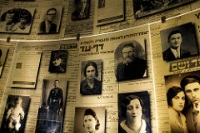
Yad VaShem
The museum documents and commemorates the events of the Holocaust, and also furthers education through ongoing research into the period. In this way, it honours the millions of Jews who died during World War II. Visitors will find the largest and most comprehensive collection of Holocaust material in the world, which includes documents, photographs, films and videotaped testimonies of survivors. These can be read and viewed in the allocated rooms. Engaging with the information is a sobering, emotional experience.The Hall of Names recognises the Holocaust's six million victims, and is an inspiring tribute to them.
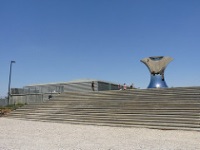
The Israel Museum
The Israel Museum has achieved world-class status. Its remarkable collections include displays of archaeology from the Holy Land, a comprehensive compilation of Judaica and the ethnology of Jewish people, plus a fine-art collection encompassing Old Masters and renowned contemporary works. Many temporary exhibitions, publications, lectures and educational activities form part of the museum's cultural programme. The Dead Sea Scrolls, which date from between the 3rd century BCE and the 1st century CE, are perhaps the museum's most exciting artefacts. A young Bedouin shepherd famously discovered them in a cave in 1947.
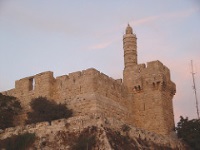
Citadel or Tower of David
Called the Tower of David, Jerusalem's Citadel is a medieval fortress with architectural elements from later periods. Its tallest tower, the Phasael, is the best place to appreciate its magnificent view of the city. The Citadel contains the excellent Museum of the History of Jerusalem, which displays 4,000 years' worth of the city's past in its rooms and courtyards. Free tours of The Citadel and museum are conducted in Hebrew on Tuesdays at 10:30am, and in English every day except Friday and Saturday at 11am. The 'light and sound' show held almost nightly is also a delightful way to learn about the history of Jerusalem.
Bethlehem
Bethlehem is just six miles (10km) south of Jerusalem, and is a major tourist attraction for pilgrims and visitors alike. Reputed to be the birthplace of Jesus, the town is charming despite its tourist-centred commercialism. The Church of the Nativity is the focal point for visitors, and is erected over the site of Jesus' birthplace. Bethlehem is also a wonderful place to see a variety of monasteries that represent different Christian denominations. Christmas is celebrated on three separate dates in accordance with the Catholic Church calendar, the Eastern calendar followed by the Armenians, and the Julian calendar followed by the Greek Orthodox and Eastern churches.
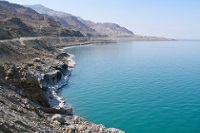
The Dead Sea
The Dead Sea and its immediate environment have many natural wonders. Wellness travellers are most interested in the high salt and mineral concentration found in its waters, which, besides enabling visitors to float effortlessly on the surface, give the region's black mud tremendous therapeutic properties. As the water is wonderfully warm, swimming is possible all year round. The Dead Sea region also boasts some fascinating archaeological sites, with traces of Persian, Greek, Roman and other civilisations remaining. Notable historical locations include the notorious biblical city of Sodom.
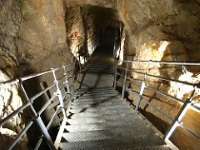
Hezekiah's Tunnel
Hezekiah's Tunnel is an absolute must-see for those who like to combine their sightseeing with a real sense of discovery and adventure. The tunnel is about 2,700 years old and was built by King Hezekiah in preparation for an invasion by the Assyrians. His plan was to shut down springs based outside the city, and redirect water through a tunnel under the city walls. In this way, he looked to protect Jerusalem's precious water supply and outlast the invaders.
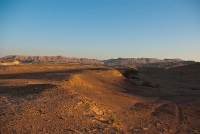
Makhtesh Ramon (Ramon Crater)
The Makhtesh Ramon (Ramon Crater) is a fascinating geological site in Israel's Negev Desert. Located about 53 miles (85km) south of Be'er Sheva, it owes its form to millions of years of erosion and weathering following the ocean's withdrawal, rather than a meteor impact. These days, the vast crater is housed within Ramon National Park: one of Israel's most popular ecotourism destinations. Shaped like an elongated heart, the crater is a magnificent sight and a powerful reminder of the region's incredible age. A variety of indigenous plants and animals populate the area, including the Nubian ibex, striped hyena, Arabian leopard and Dorcas gazelle.
Getting Around
Jerusalem has an extensive public bus service, and most drivers speak English. Most bus services stop over Shabbat (from sundown on Friday to sundown on Saturday), which means tourists have to find alternative transport at these times.
Taxis are plentiful, identifiable by a yellow sign on the roof, and can be hailed in the street, ordered by telephone or hired outside hotels and the main places of interest. Taxis are metered and charge more late at night and on Saturdays and public holidays. Passengers should make sure the taxi driver turns the meter on at the start of a journey.
Shared taxis (sheruts) are another popular form of transport, travelling fixed routes and usually costing about the same as a bus. Passengers can get on and off when they need to, though drivers (and fellow passengers) can be impatient when it comes to delays. Ride sharing for a fee is illegal in Israel. Uber does operate in the country, but only as a service for ordering taxis. Other apps that provide the same service are Gett, Raxi and Yango.
Local drivers tend to be unruly and visitors often find driving a bit stressful, especially if they don't understand the road signs. The old city area is compact enough to explore on foot, and this is certainly the most interesting way to get around.
Jerusalem Climate and Weather
The climate of Jerusalem is said to be ideal, with its relatively high altitude ensuring warm, dry summer weather with low humidity, and contrasting chilly, wet winters. Snow may fall in winter but is a rarity that is greeted as a novel experience by locals. Summer days are sunny and pleasant with temperatures averaging around 75F (24C). In the shoulder seasons of spring and autumn, Jerusalem sometimes experiences the hot, dry desert wind known as the sharav or khamsin, traditionally believed to blow for 50 days out of the year.
Peak tourism season in Jerusalem is summer, particularly July and August. Jerusalem doesn't get as hot as some other parts of Israel, but it can get crowded. June is a good time to visit as travellers get the pleasant summer weather but not as many crowds. Even in summer, visitors may need a sweater occasionally after dark because the city can get chilly at night.
May or October (late spring and autumn) are also good times to travel to Jerusalem. But, as October is holiday season for the Israelis, things tend to get more expensive over this period and some restaurants and shops will close in the city as locals leave for holiday.
Israel travel info
Electricity
230 volts, 50Hz; European-style two-pin and round three-pin plugs are used.
Language
Hebrew is the official language of Israel. Arabic was an official language until 2018, when it was downgraded to having a 'special status in the state'. Most of the population also speaks English.
Money
Israel's currency is the Israeli Shekel (ILS), which is divided into 100 agorot (singular is agora). Money can be changed in the small exchange bureaux found on most main streets, or at banks and hotels. ATMs are prevalent throughout the country. Most banks are open Sunday through to Friday until noon, and are open again from 4pm till 6pm on Sundays, Tuesdays and Thursdays. Major credit cards are widely accepted.
Tipping
Tipping is expected according to the level of service, unless a service charge is added to the bill. Around 10 to 15 percent is customary.
Health
There are no special health precautions required for travel to Israel, but insect protection from August to November is recommended due to the prevalence of the West Nile virus, which is transmitted by mosquitoes. A hepatitis A vaccine is sometimes recommended by doctors, as is a tetanus vaccine and an MMR (measles, mumps, rubella) vaccination for those who haven't already had it.
Medical facilities in Israel are excellent but treatment can be very expensive, so it is essential that travellers take out full travel health insurance. It should be possible to get all necessary medications in the cities but it is always advised that travellers who need certain medications take them on their travels, along with the prescription and a letter from their doctor.
Safety
Travellers in Israel should maintain a high level of vigilance and keep up to date with developments. The risk of terrorist attacks remains high and travellers to the region, including Jerusalem, need to exercise caution, particularly around locations specifically targeted by attacks in the past such as bars, nightclubs, markets and buses. Suicide bombers and other militants have targeted crowded public areas, resulting in hundreds of deaths and injuries over the years. Although foreigners have not been specific targets, many have been caught up in the attacks because they visited famous landmarks and religious sites.
All travel to the Gaza Strip and the West Bank, and the eastern border with Syria should be avoided. Foreign nationals face an ongoing threat of kidnapping in the Gaza Strip and West Bank. The frequent outbreaks of violence in these areas makes them extremely dangerous, even if tourists are not directly targeted.
Street crime is rare in Israel, though, and generally only a problem in 'bad' areas. The mugging of foreigners is unusual but pick-pocketing is not unheard of in busy market areas, so visitors should take normal precautions against this kind of crime.
Local customs
Israel is a largely religious society and religious customs should be respected. Indecent behaviour is not tolerated and offenders will be arrested and fined heavily or imprisoned. Care should be taken not to photograph any military or police personnel or installations, and visitors should be discreet about taking photographs in Jewish Orthodox areas and of Jewish Orthodox people. It is advisable to carry official identification at all times, and to dress modestly.
Doing business
The majority of business in Israel is centred in Tel Aviv. Dress tends to be less formal than in the US and Europe, but as business people tend to wear suits for important meetings or presentations, formal attire is recommended. Women should dress more conservatively, especially in strictly religious areas.
Business cards are usually exchanged, though with little formality involved. Meetings often do not begin promptly and much time can be given to socialising. Business hours are usually from 8:30am to 5pm, from Sunday to Thursday, and on Friday mornings. Sundays are regarded as a normal business day.
Duty free
Travellers to Israel do not have to pay duty on 200 cigarettes or 250g of other tobacco products; 2 litres wine and 1 litre of other types of alcoholic beverages; 250ml of eau de cologne or perfume; and gifts to the value of US$200. Prohibited items include fresh meat and fresh fruit (especially from Africa).
Communications
The international access code for Israel is +972. The outgoing code is 00 (not from public phones) followed by the relevant country code (e.g. 0044 for the United Kingdom). Hotels, cafes and restaurants offering free WiFi are widely available. As international roaming costs can be high, purchasing a local prepaid SIM card can be a cheaper option.
Passport & Visa
All foreign passengers to Israel must hold proof of sufficient funds to cover their stay in the country. Visitors should also hold return or onward tickets, and the necessary travel documentation for their next destination.
Passengers intending to proceed from Israel to Arab countries other than Egypt, Jordan or the United Arab Emirates should ensure that their passport does not contain an Israeli visa or stamps, since no passenger is allowed to enter other Arab countries with such passports.
Travellers may enter Jordan directly from occupied territory, but must hold a visa for Jordan (to be obtained from a representation of Jordan abroad), otherwise entry will be refused. The Jordanian authorities will not permit re-cross to occupied territory. Travellers may also enter occupied territory directly from Jordan. The Israeli authorities will permit a re-cross to Jordanian territory.
It is highly recommended that travellers' passports have at least six months' validity remaining after the intended date of departure from their travel destination. Immigration officials often apply different rules to those stated by travel agents and official sources.
Entry requirements
US citizens must have a passport that is valid for six months beyond the period of intended stay in Israel. No visa is required for stays of up to three months.
UK citizens must have a passport that is valid for six months beyond the period of intended stay in Israel. No visa is required for stays of up to three months.
Canadian citizens must have a passport that is valid for six months beyond the period of intended stay in Israel. No visa is required for stays of up to three months.
Australian citizens must have a passport that is valid for six months beyond the period of intended stay in Israel. No visa is required for stays of up to three months.
South African citizens must have a passport that is valid for six months beyond the period of intended stay in Israel. No visa is required for stays of up to three months.
Irish citizens must have a passport that is valid for six months beyond the period of intended stay in Israel. No visa is required for stays of up to three months.
New Zealand citizens must have a passport that is valid for six months beyond the period of intended stay in Israel. No visa is required for stays of up to three months.
Useful contacts
Israeli Tourist Office: www.goisrael.com
100 (Police); 101 (Ambulance)Embassies / consulates in other countries
Israeli Embassy, Washington DC, United States: +1 202 364 5500.
Israeli Embassy, London, United Kingdom: +44 20 7957 9500.
Israeli Embassy, Ottawa, Canada: +1 613-567-6450.
Israeli Embassy, Canberra, Australia: +61 2 6215 4500.
Israeli Embassy, Pretoria, South Africa: +27 12 470 3500.
Israeli Embassy, Dublin, Ireland: +353 1 230 9400.
Consulate of Israel, Wellington, New Zealand: + 64 4 439 9500.
Embassies / consulates in Israel
United States Embassy, Tel Aviv: +972 3 519 7575.
British Embassy, Tel Aviv: +972 3 725 1222.
Canadian Embassy, Tel Aviv: +972 3 636 3300.
Australian Embassy, Tel Aviv: +972 3 693 5000.
South African Embassy, Tel Aviv: +972 3 525 2566.
Irish Embassy, Tel Aviv: +972 3 696 4166.
New Zealand Embassy, Ankara,Turkey (also responsible for Israel): +90 312 446 3333.



